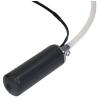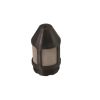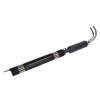Solinst Model 415 12V Submersible Pump Controller
Features
- Runs from 12V power source
- Convenient LED lights indicate pump status
- Easy-to-reset circuit breaker means no fuse to replace
- Free ground shipping
- Expedited repair and warranty service
- Lifetime technical support
- More
Overview
The Solinst 12V Submersible Pump Controller, when combined with the pump, is a lightweight and portable groundwater sampling system.
Mechanics
The Solinst Submersible Pump cable simply connects to the 12V Pump Controller, which then clips to a 12V power source. The 3/8" (9.5 mm) ID LDPE sample tubing is pushed onto the barbed fitting on the 12V Pump. It has an easy-to-reset circuit breaker (no fuse to replace). Simply turn the dial on the 12V Pump Controller clockwise to increase the voltage to the Controller, which turns the Pump’s motor faster and increases the flow rate.
Design
Convenient LED lights on the Controller indicate the status of the 12V Submersible Pump system, including high or low battery voltage, proper battery connection, normal operation and maximum flow rate.
Sampling Depth: As much as 36.5 m (120 ft) below ground surface
Flow Rates: Up to 13.5 L/min (3.6 US gpm)
Pump Cable Length: 130 ft (40 m)
Pump Cable Weight: 3.5 kg ( 7.8 lbs)
Wetted Materials: ABS pump body, 304 stainless steel motor, impeller and eyebolt, polypropylene hose barb, nitrile/buna o-rings and seals, PVC jacket electrical wire
Pump Size: 4.78 cm OD x 13.97 cm long (1.88" x 5.5")
Pump Weight: 0.8 kg (1.8 lbs)
Controller Size: 33 cm x 13 cm x 17 cm (13” x 5” x 6.5”)
Controller Weight: 3.4 kg (7.5 lbs)
Controller Cable Length: 1 m (3.5 ft)
Power Source: 12V Deep Cycle 60 amp AGM Battery or larger, or vehicle or marine battery.
Voltage Required: 12.5V–15V at source
Power Draw: 20mA (when dial is OFF), 3A (dial is at 1) to 36A (dial is at MAX (10))
Max. Run Time: Continuous, as long as Pump fully submerged during operation
Warranty: 12V Submersible Pump: 90 Days; 12V Pump Controller: 3 Years
In The News
Floating Global New Ideas: Buoy-Enabled Research at Florida Agricultural and Mechanical University’s School of the Environment
Florida Agricultural and Mechanical University (FAMU), based in Tallahassee, Florida, is the highest-rated public Historically Black College or University in the United States. FAMU’s School of the Environment (FAMU-SOE) offers BS and BA degrees in Environmental Studies, and BS, MS, and Ph.D. degrees in Environmental Science, with specialisms available in areas including Environmental Policy and Risk Management, Aquatic and Terrestrial Ecology, and Biomolecular Sciences. In 2021, FAMU-SOE deployed a NexSens CB-450 buoy in Apalachee Bay, a key oyster farming area around 30 miles south of Tallahassee. The buoy has quickly been incorporated into the curriculum, providing environmental insights for student research, the community, and beyond. Dr.
Read MoreMonitoring Habitat Suitability and Water Quality in Northwest Arkansas Springs
Northwest Arkansas has seen an economic, industrial, and population boom in recent years as a result of expanding businesses, which have created thousands of jobs in the region and the mass migration of employees and construction companies. However, with this growth has come rapid urbanization and the degradation of the natural landscape, specifically the freshwater springs that can be found throughout the region. These springs are critical habitat centers for native wildlife, home to threatened and endangered fish, and those that have yet to be listed. Zach Moran, Assistant Professor of Fisheries Science at Arkansas Technical University, is working to help monitor these habitats and provide key data that will hopefully inform future development in the region.
Read MoreThree Decades of Research at Acton Lake
A multi-disciplinary team at Miami University, Ohio, has been studying the environmental change at Acton Lake for over three decades. Using three different NexSens buoys over this time, the team has an incredible archive of data that is helping build a picture of Acton’s past, present, and future. Until recently, a NexSens CB-50 buoy was used alongside other environmental monitoring at Acton Lake. In May 2025, the Miami team deployed a new XB-200 buoy , future-proofing their ongoing monitoring using real-time buoy systems. Acton Lake, a small hypereutrophic reservoir in southwest Ohio, covers 2.4km² and has a maximum depth of about 8m. The dam was built in 1956, and the lake has a large agricultural watershed.
Read More















